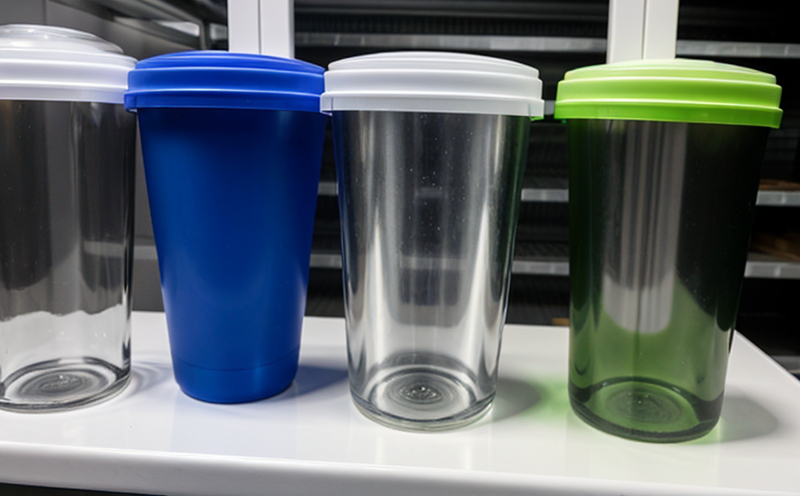ISO 754-3 Long-Term Chemical Exposure Testing
The ISO 754 series specifies methods for testing the chemical compatibility of packaging materials. Specifically, ISO 754-3 outlines procedures to determine whether glass packaging materials are susceptible to long-term chemical exposure that could affect their integrity and performance over time.
This test is crucial in ensuring that glass packaging does not leach harmful chemicals into the contents it contains. For instance, prolonged contact with certain substances such as acidic or alkaline solutions can cause the glass to release silicate compounds, which may contaminate the product and pose health risks if ingested.
The test is particularly important for industries where product safety and quality are paramount, including pharmaceuticals, food & beverage, cosmetics, and household chemicals. It ensures that packaging materials do not compromise the integrity of the products they protect, thereby maintaining consumer trust and regulatory compliance.
During this testing procedure, glass specimens are exposed to controlled chemical solutions for extended periods under conditions that mimic real-world storage scenarios. This includes temperature, humidity, and solution composition, which can vary depending on the specific application. Specimens are then analyzed for any signs of degradation or leaching using spectroscopic methods, chromatography, and other analytical techniques.
The test protocol is designed to simulate long-term use in various environments, ensuring that glass packaging remains safe and effective over its intended life cycle. This includes testing under extreme conditions such as high temperatures, humidity, and exposure to acidic or alkaline solutions.
Understanding the chemical compatibility of glass materials with different substances is critical for industries that rely on glass for packaging. For example, in the pharmaceutical industry, it’s essential to ensure that glass vials used for drug storage do not leach harmful compounds into the medication. Similarly, in the food and beverage sector, glass containers must be free from any material that could affect the taste or quality of the product.
The ISO 754-3 test is also beneficial for R&D engineers who are developing new glass-based packaging solutions. By using this standardized procedure, they can identify potential issues early in the design process and make necessary adjustments to enhance the safety and performance of their products.
The results of this testing play a crucial role in the quality assurance processes of manufacturing facilities. Compliance officers rely on these tests to ensure that all glass packaging materials meet industry standards and regulatory requirements. This helps prevent costly recalls and protects brand reputation.
Benefits
The ISO 754-3 Long-Term Chemical Exposure Testing provides several key benefits to manufacturers, quality managers, and compliance officers:
- Enhanced Product Safety: By ensuring that glass packaging does not leach harmful chemicals into the products it contains, this test helps protect consumer health.
- Regulatory Compliance: The results of this testing can be used to demonstrate compliance with international standards and regulations.
- Improved Quality Assurance: This test is an integral part of quality assurance processes, helping to maintain consistent product integrity over time.
- Risk Mitigation: Early identification of potential issues in the design or manufacturing process can help mitigate risks and reduce the likelihood of costly mistakes down the line.
- Innovation Support: For R&D engineers, this test provides valuable insights into the chemical compatibility of glass materials with various substances, facilitating innovation in packaging solutions.
Industry Applications
The ISO 754-3 Long-Term Chemical Exposure Testing is widely applicable across several industries:
- Pharmaceuticals: Ensuring that glass vials and ampules used for drug storage do not leach harmful compounds into the medication.
- Food & Beverage: Guaranteeing that glass containers maintain the integrity of food and beverage products, protecting their taste and quality.
- Cosmetics: Ensuring that glass packaging does not contaminate cosmetics with harmful chemicals, maintaining product purity and safety.
- Household Chemicals: Protecting consumers from exposure to potentially hazardous substances through safe and effective packaging solutions.
Why Choose This Test
The ISO 754-3 Long-Term Chemical Exposure Testing is a critical component of quality assurance processes for glass packaging manufacturers. Here’s why this test should be chosen:
- Standardized Methodology: This test adheres to the ISO 754 series, ensuring consistency and reliability in results.
- Comprehensive Analysis: The testing process provides a comprehensive analysis of glass materials under various chemical exposure scenarios.
- Expertise and Experience: Our laboratory specializes in this type of testing, leveraging years of experience to deliver accurate and reliable results.
- Compliance Assurance: By ensuring that all packaging materials meet industry standards and regulatory requirements, this test helps avoid costly non-compliance issues.
- Risk Management: Early identification of potential issues in the design or manufacturing process can significantly reduce risks and prevent costly mistakes.
- Innovation Support: This test provides valuable insights into the chemical compatibility of glass materials with various substances, facilitating innovation in packaging solutions.





